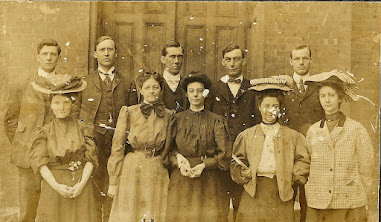Bertie E. Armstrong,
Schoolmarm*
I was 24 years old when my paternal grandmother, Bertie Elnora (Armstrong) McLean, passed away on 5 July 1970 at her home in Roseville, Ohio. She’d been born in White Cottage, Ohio on 28 November 1876 to Alexander and Nancy Elizabeth (Holloway) ArmstrongBertie engrossed in a book, 1902
I regret that I didn't know Grandma very well. I remember she was stout and short (under 5’ tall), and always appeared in a print cotton dress with a bib apron over it, cotton stockings, and, I think, tie shoes, but possibly she wore slippers. Over the years, Grandma became increasingly blind, and then in her late 80’s became bed- ridden with some undiagnosed palsy-like condition that caused her to twitch constantly. Her condition scared me, and so I avoided her as much as possible, never appreciating what a treasure-house of lore and information she had been until after she was gone. What I know of her comes second-hand—from dozens of old family photographs, and from a few memories shared by other family members.
Grandma McLean was well-known in the Roseville area because she'd been a first-grade school teacher in a place and time where teachers were paid little but received a lot of respect. My grandmother was more than respected; she was loved. When she died in 1970, a number of her former students attended her funeral or wrote notes of condolence, reminiscing about what a wonderful teacher she had been. As a child, I remember that Sunday afternoon visitors frequently included a former pupil.
I was told Grandma began teaching at the age of 18, which would have been in 1894. Although teacher training institutions (known as “normal schools”) began in the mid-1800's in the United States, there was none near White Cottage, Ohio. Besides, becoming a teacher in the late 19th Century, particularly in rural parts of the country, didn’t require a formal education. Frustratingly, there is little information regarding how, exactly, a person became a teacher in rural America at the time Grandma entered the profession. Being of good moral character has always been an expectation of those who want to become teachers, and probably being “bookish” was a plus, but by the 1890’s, even in rural areas, these would not have been sufficient.
To become a teacher in 1894, Grandma likely had to demonstrate academic proficiency in several subject areas by passing an exam. Two years prior, in 1892, the Ohio legislature passed the Boxwell Law to provide greater access to a high school education for rural students. Eighth grade students who passed the test were eligible to attend high school tuition-free. Although there is limited information about rural teacher education in the late 19th Century, it appears that to become a teacher, Grandma would have had to have passed the Boxwell, or something very much like it. Testing of teacher candidates apparently was administered by either members of the local school board, or the local superintendent. In Grandma’s day, these local authorities were at the township or village level. There were no state or county education departments to impose any uniformity among schools in a broader area, and no set curriculum beyond the basics of “the 3 Rs”.
However, the Boxwell Examination required the test-taker to know more than just readin’, writin’, and ‘rithmetic. Grandma probably had to demonstrate to local education authorities that she knew something about: physical geography (e.g. types of landforms and bodies of water); orthography (spelling and punctuation); arithmetic (e.g. “I sold an article for $17.50 and lost 12%; what per cent would I have gained or lost had I sold it for $15.00?”); grammar and composition (e.g. “Write a sentence that will contain a noun in the objective case, a noun in apposition, a pronoun in the possessive case, and a descriptive adjective.”); geography (e.g. “Where would you go to see the following: Bunker Hill Monument? Garfield’s Monument? Mammoth cave? Tower of Pisa? Garden of the Gods? The Erie Canal? Lookout Mountain? Harvard College? Statue of Liberty? Falls of Minnehaha?”); U.S. history and government (e.g. “With what event in history is the name of each associated: Balboa? De Soto? Cyrus Field? Alexander Hamilton? Daniel Webster?” and “What difficulties were experience under ‘The Articles of Confederation’?”); physiology (e.g. “Describe the alimentary canal.”). Undoubtedly, she also had to demonstrate good handwriting and the ability to read aloud.
 |
| Bertie Armstrong (far left) with other school faculty members about 1896 |
I grew up with the idea that Grandma taught in a one-room schoolhouse, and recall hearing she had to trudge through inclement weather to get the pot-bellied stove fired up and the room warmed before the first student came through the door. Photos of Grandma taken throughout her teaching career reveal the one-room schoolhouse to be a romantic fiction of her descendants. The verso of the above photo identifies these individuals as “school faculty”, something obviously not found in a one-room schoolhouse. They stand in front of Bluffdale School, a brick building with nice double doors, and six classrooms. Far from being a one-room schoolhouse, Bluffdale was literally the roomiest schoolhouse of any Newton Township village or special district. Several class photos of Grandma, such as the one below, also dispel the one-room schoolhouse myth. They include a bearded man identified on the photo verso as the school janitor. If anyone were trudging through inclement weather to get the stove(s) started, it was he.
 |
| Bertie with her first-graders and the school janitor, 1900 |
* "Schoolmarm" is an American term for a female teacher in a rural or village school. First coined in 1834, the term was still in use when Grandma became a teacher.

Makes me proud to have been a teacher in Ohio. And I thought I Wasn't making much when I only earned 3000 my first year!
ReplyDelete